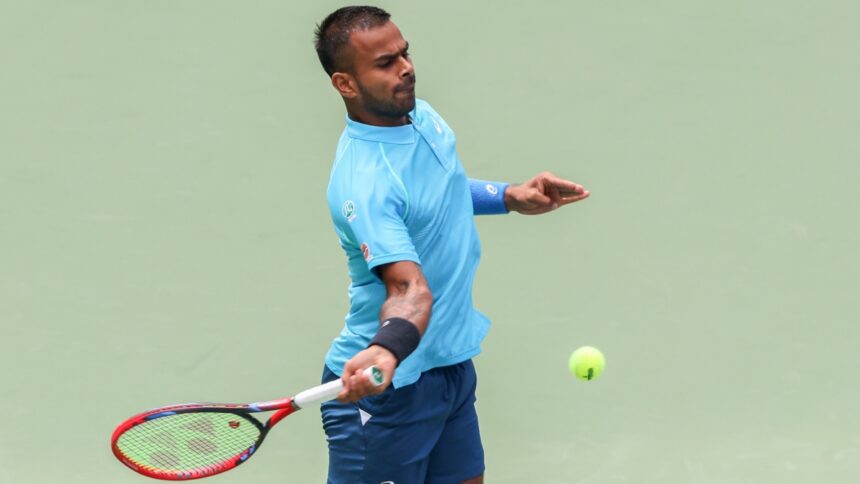Sumit Nagal’s Absence from Davis Cup: An Analysis of the Situation and Its Implications for Indian Tennis
Introduction
The world of professional sports is often rife with complications, particularly when it comes to balancing personal health, national duty, and management decisions. One of the most recent controversies has arisen in Indian tennis, centering on India’s top player, Sumit Nagal. Nagal has announced his decision to opt out of upcoming Davis Cup ties, igniting a wave of discussions around the implications of his choices for both his career and the Indian tennis landscape.
The Situation
Recently, Nagal, currently ranked 98 in the ATP standings, chose to withdraw from several key matches for the national team, including ties against Pakistan and Sweden due to a combination of personal and health-related reasons. He has expressed concerns about competing while injured, indicating that such participation could not only threaten his health but also negatively impact the team’s performance. Nagal emphasized that playing for the country is an honor, but he must prioritize his health.
Back Injury and Previous Withdrawals
Nagal’s back strain has been cited as a primary reason for his absence from the team. Following a previous withdrawal from the tie against Sweden, he explained that it was a difficult decision but one made necessary after consultations with his medical team. He clarified that neglecting his health would be counterproductive—both for him and the team.
Reactions from Team Management
Captain Rohit Rajpal and the All India Tennis Association (AITA) have expressed frustration over Nagal’s decision. Rajpal reportedly made attempts to engage with Nagal regarding his availability but received little response. In an interview, he expressed disappointment, noting that after accommodating Nagal’s previous demands, the decision to abstain from national duty was unacceptable.
An AITA source suggested that Nagal’s insistence on particular court conditions for the Davis Cup tie further complicated matters. The decision to use slow hard courts was made with Nagal’s input, yet his refusal to play has led to disenchantment among officials and team members, who feel that he is undermining the captain’s authority.
The Broader Implications
Nagal’s absence raises questions about the unity and commitment within the Indian tennis team. This isn’t just about one player opting out; it’s a reflection of deeper issues that can affect the morale of other athletes. Historical comparisons have been drawn to legendary players like Leander Paes and Mahesh Bhupathi, who maintained a spirit of team unity and respect for leadership, which some perceive as lacking in today’s generation of players.
What’s at Stake?
With a crucial tie against Togo scheduled for February 2025, the Indian team is in need of strong performances to solidify its standing in the Davis Cup. Players like Sasikumar Mukund, who is returning from suspension, and other less experienced members such as Ramkumar Ramanathan and Karan Singh, will have the responsibility to step up in Nagal’s absence. This situation creates not just an opportunity for them to showcase their abilities, but also adds pressure to deliver results without their top-ranked teammate.
The Question of Prioritization
A broader debate stems from Nagal’s situation about how professional athletes manage their careers alongside national commitments. Critics suggest that opting out of national duty for health reasons must be justified against the athlete’s overall career goals. While every athlete deserves to prioritize their health, there’s a concern about how this might influence perceptions of commitment and dedication to representing one’s country.
Nagal himself has not been shy in discussing the complexities of injury management in professional sports, explaining that proper recovery involves a careful balance. He insists that athletes’ discussions regarding their participation, particularly on compensation, should take place behind closed doors to prevent speculation and misunderstanding.
Conclusion
Sumit Nagal’s decision to opt out of the Davis Cup matches has ignited discussions about athlete responsibility, the challenges of competing at a professional level, and the expectations of national pride. With a blend of personal health considerations and significant pressure from team management, this situation could serve as a pivotal moment in not just Nagal’s career, but in the evolution of Indian tennis.
As the February tie approaches, stakeholders within the Indian tennis community will undoubtedly be watching closely to see how this situation unfolds and what it means for the future of the sport in the country. Balancing personal health, national allegiance, and the dynamics of team leadership will remain critical as the tennis community navigates these choppy waters.










